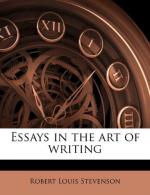But the adventures of Treasure Island are not yet quite at an end. I had written it up to the map. The map was the chief part of my plot. For instance, I had called an islet ‘Skeleton Island,’ not knowing what I meant, seeking only for the immediate picturesque, and it was to justify this name that I broke into the gallery of Mr. Poe and stole Flint’s pointer. And in the same way, it was because I had made two harbours that the Hispaniola was sent on her wanderings with Israel Hands. The time came when it was decided to republish, and I sent in my manuscript, and the map along with it, to Messrs. Cassell. The proofs came, they were corrected, but I heard nothing of the map. I wrote and asked; was told it had never been received, and sat aghast. It is one thing to draw a map at random, set a scale in one corner of it at a venture, and write up a story to the measurements. It is quite another to have to examine a whole book, make an inventory of all the allusions contained in it, and with a pair of compasses, painfully design a map to suit the data. I did it; and the map was drawn again in my father’s office, with embellishments of blowing whales and sailing ships, and my father himself brought into service a knack he had of various writing, and elaborately forged the signature of Captain Flint, and the sailing directions of Billy Bones. But somehow it was never Treasure Island to me.
I have said the map was the most of the plot. I might almost say it was the whole. A few reminiscences of Poe, Defoe, and Washington Irving, a copy of Johnson’s Buccaneers, the name of the Dead Man’s Chest from Kingsley’s At Last, some recollections of canoeing on the high seas, and the map itself, with its infinite, eloquent suggestion, made up the whole of my materials. It is, perhaps, not often that a map figures so largely in a tale, yet it is always important. The author must know his countryside, whether real or imaginary, like his hand; the distances, the points of the compass, the place of the sun’s rising, the behaviour of the moon, should all be beyond cavil. And how troublesome the moon is! I have come to grief over the moon in Prince Otto, and so soon as that was pointed out to me, adopted a precaution which I recommend to other men—I never write




